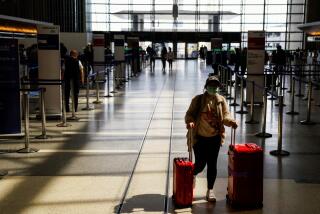French Search for No-Show Jet Passenger
- Share via
PARIS — French police are searching for a passenger who did not show up for a Paris-Los Angeles flight that was canceled on Christmas Eve at U.S. request because of a feared Al Qaeda plot, French law enforcement officials said Wednesday.
A U.S. official said the name on a reservation for the flight resembled that of a member of the Taliban who escaped from U.S. custody in Afghanistan. U.S. investigators said they had no indication that the passenger was the same man, but wanted to know why he failed to show up for the Air France flight.
The U.S. official and two other U.S. law enforcement officials downplayed the urgency of the search. One characterized it as “tying up a loose end.”
An FBI official said late Wednesday that a vigorous search was continuing. “We will continue to investigate this until we’re absolutely sure” that the no-show passenger was not a terrorist, he said.
French officials said Wednesday that they still had not confirmed U.S. suspicions about a plot, but a spokesman for Justice Minister Dominique Perben confirmed that a search was underway for the man.
Perben’s brief comments to a French radio station came in response to an ABC News report that a man on the passenger list was under scrutiny.
French authorities have said consistently that an exhaustive investigation had turned up no evidence that suspects affiliated with Al Qaeda and the Taliban planned an attack on a Los Angeles-bound flight. Even U.S. officials said recently that the investigation of the remaining potential suspects, passengers who booked seats but did not come to the airport, was in its final stages.
The truth about a suspected plot against an Air France flight, six of which were canceled during the holidays, remains murky. Information on both sides of the Atlantic was sometimes contradictory Wednesday. U.S. and French counter-terrorism agents have cooperated closely under intense time pressure, but have struggled with fragmentary intelligence and confusion over identities.
“This [passenger] did not show up for the flight,” said a senior French law enforcement official, who asked to remain anonymous. “He has not been identified. We are not at all sure he is the same person as the one being sought by the Americans. We want to find him to find out.”
The passenger being sought was listed on the Air France passenger list as “Hai,” the law enforcement official said. U.S. agents passed on the name of an Afghan suspect identified variously as Abdou Hai or Abdul Hay, which could be either one or two names, the official said. Afghans often use only one name, and Hai is a common Arabic name.
The FBI and CIA have said the Afghan escapee was linked to Al Qaeda, the French law enforcement official said. “He is not known to the French as a terrorist. He is not in our files. According to the intelligence from the Americans, he is a Taliban who escaped from prison in Afghanistan. He was captured during the fighting after Sept. 11 in Afghanistan. And he escaped from an American military prison there, apparently in recent months.”
The idea of a Taliban fighter participating in an Al Qaeda hijacking plot is unusual. The Al Qaeda terrorist network and the Taliban were allies, but Taliban members tended to be Afghan military combatants. Osama bin Laden’s clandestine Al Qaeda operatives, especially those involved in aviation plots, have mostly been Arabs or Europeans with education and cultural backgrounds enabling them to blend into Western society.
The official pointed out that French police, acting on U.S. intelligence over Christmas, questioned about a dozen passengers at the airport and later investigated a number of no-shows, but cleared them all.
In several cases, suspicions were based on names similar to those on U.S. watch lists, the official said.
“Remember that intelligence is often based on interpretation,” the official said. “In this case there were codes that the intelligence services understood to be flight numbers. It could be a coincidence. There were several cases of similar names.”
The 19 hijackers in the Sept. 11 plot bought their plane tickets using their real names; two were on a CIA watch list and the rest had clean records. Briton Richard Reid, the convicted “shoe bomber” who tried to blow up a Paris-Miami flight, also traveled under his real name.
European and U.S. officials questioned a key element of the ABC report that recalled the Reid case. The officials denied the report’s assertion that a Europe-wide manhunt was underway because the no-show passenger was thought to have an explosive device designed for smuggling onto a plane.
“We regard the thesis of a mini-bomb with reservations,” the French law enforcement official said.
Top anti-terrorist police officials in Italy and Spain said they had not received any request for help in finding a suspect in the Air France case or heard that he might have such explosives.
Concerns about an airborne attack were heightened in December after the arrest in Britain of an alleged associate of Reid who was suspected of rigging a device for smuggling explosives past airport security.
*
Rotella reported from Paris and Meyer from Washington. Times staff writer Greg Krikorian in Los Angeles contributed to this report.
More to Read
Sign up for Essential California
The most important California stories and recommendations in your inbox every morning.
You may occasionally receive promotional content from the Los Angeles Times.










